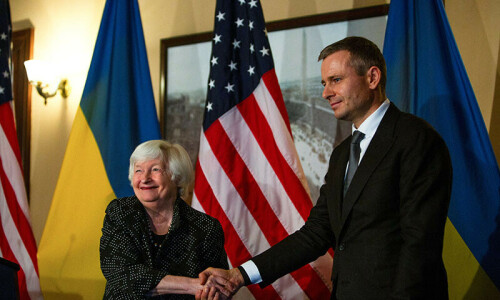WASHINGTON: The details of a $50 billion loan to help Kyiv have been finalized by G7 leaders. The loan is backed by profits from Russian sovereign assets that were frozen after its invasion of Ukraine.
The wealthy democracies that make up the Group of Seven have stated that they “have reached a consensus on how to deliver” the loans totaling approximately $50 billion, with the intention of beginning to distribute funds by the end of this year.
The leaders of the G7 went on to say that “the loan proceeds will be disbursed through multiple channels to support Ukraine’s budgetary, military, and reconstruction assistance.”
This week, world financial leaders gathered in Washington for meetings hosted by the World Bank and the International Monetary Fund. Their announcement came on Friday.
According to the statement, finance ministers have “agreed on a technical solution ensuring consistency, coordination, fair lending distribution, and solidarity among all G7 partners.”
The leaders continued, “We will not tire in our resolve to give Ukraine the support it needs to prevail.”
They demanded that Moscow end the war and compensate Ukraine for its losses.
$20 billion in US assistance This week, US President Joe Biden stated that the United States would provide Ukraine with $20 billion in loans as part of the G7 package. These loans would be repaid by the interest earned from immobilized Russian sovereign assets.
This aims to assist Ukraine right now “without burdening taxpayers.” Our efforts demonstrate this: According to Biden, “tyrants will be accountable for the damages they cause.”
On Wednesday, US Treasury Secretary Janet Yellen and her Ukrainian counterpart Sergii Marchenko signed a statement announcing their agreement to take out the loan.
Additionally, the move stipulated that no new Ukrainian or American tax dollars would be used to repay.
According to US officials, a consortium of G7 partners, including the European Union, the United Kingdom, Canada, and Japan, are expected to provide the remaining $30 billion in loans.
The majority of immobilized Russian assets worldwide have been frozen by the EU, which has frozen approximately $235 billion in Russian central bank funds. The EU pledged to contribute EUR18 billion, or $19.4 billion.
Ursula von der Leyen, the head of the 27-nation bloc, said in a statement that Russia had to end its illegal war of aggression and pay for the damage it had caused.
“We are unwavering in our support for Ukraine’s struggle for freedom.” The United States had requested guarantees from the EU that the Russian assets would remain frozen, which caused delays in the implementation of the G7 loan.



